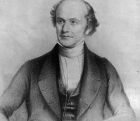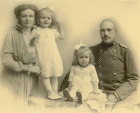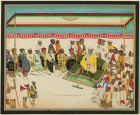International Relations
Relations across the UK, Europe and globally are frequently changing, and have done so across our history. How these relations are recorded, monitored and treated are discussed in the collection of articles and podcasts here. The very concept of international relations is explored as are when boundaries and discussions between states and groups started to matter. What are the procedures, protocols and outcomes of a world according to the history of international relations are all under scrutiny?
Sort by:
Date (Newest first) | Title A-Z
Show:
All |
Articles |
Podcasts |
Multipage Articles
-

Eastern Nigeria market women and European businesses in colonial Nigeria 1900–29
ArticleClick to view -

Real Lives: Alexander Stewart
ArticleClick to view -

Shadow states and armed struggle
ArticleClick to view -

Real Lives: A German captain’s perspective on the end of WWI
ArticleClick to view -

Films: Brezhnev – Interpretations
25th April 2025Click to view -

Recruiting volunteers to fight in the First World War
ArticleClick to view -

Films: Lenin – Interpretations
31st January 2025Click to view -

Film: Lenin, the 1905 Russian Revolution and WWI
ArticleClick to view -

Films: Khrushchev – Interpretations
9th October 2024Click to view -

Film: Khrushchev - Background
ArticleClick to view -

Films: Boris Yeltsin – Interpretations
19th June 2024Click to view -

Films: Joseph Stalin – Interpretations
27th March 2024Click to view -

Real Lives: Maharaja’s German: Anthony Pohlmann in India
ArticleClick to view -

Political and social attitudes underpinning the 1924 Olympics
ArticleClick to view -

Films: Mikhail Gorbachev – Interpretations
ArticleClick to view -

Bonapartism after Napoleon III: the Prince Imperial and Eugene Loudun
ArticleClick to view -

The Legacy of the Z Special Unit in World War II
ArticleClick to view -

The United Nations Convention on the Prevention and Punishment of the Crime of Genocide
ArticleClick to view -

Anti-Americanism in Britain during the Second World War
ArticleClick to view -

Doomed to fail: America’s intervention in Vietnam
ArticleClick to view

